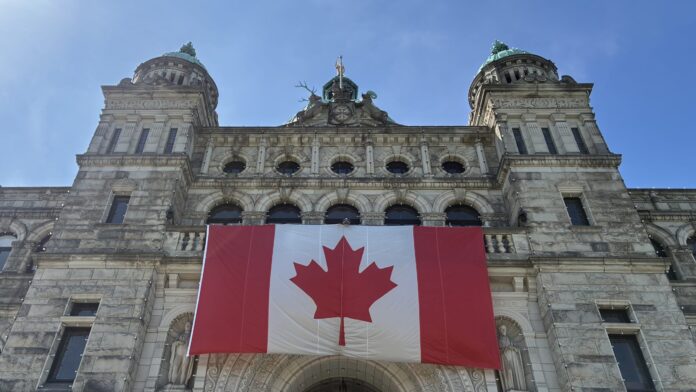The fall session of the B.C. legislature began Monday with a rare lineup of four political parties represented in the chamber.
The new session includes the B.C. Green Party under new leader Emily Lowan, who does not hold a seat, and B.C.’s newest right-leaning political party, One B.C.
Peace River North MLA Jordan Kealy returns as an Independent, while Surrey-Cloverdale MLA Elenore Sturko also sits as an Independent following her sudden ousting from the B.C. Conservative caucus last month.
Legislators are scheduled to sit for six weeks this fall.
Government House Leader Mike Farnworth said there are plans to table 18 pieces of legislation, including a bill to advance the proposed North Coast Transmission Line – a roughly 450-kilometre project running from Prince George to Terrace.
“We are framing this session very much about dealing with what matters to British Columbians, which is growing the economy, protecting health care, and dealing with issues around affordability, and good governance,” said Farnworth.

The session opens as a strike by public service workers with the B.C. General Employees Union (BCGEU) stretches into a sixth week. There’s no sign yet of the two sides returning to the negotiating table since talks broke off for a second time on Sept. 29.
BCGEU members and their supporters marched through downtown Victoria and rallied outside the legislature on Monday, urging the province to return to the bargaining table with a “credible” wage offer.
Asked whether he anticipates any disruptions due to the ongoing strike or picket lines, Farnworth said he’s confident the government will continue to function.
“The right to strike is part of labour’s rights in the province, but the best deal is always achieved at the bargaining table,” he said.
Á’a:líya Warbus, MLA for Chilliwack-Cultus Lake and the Official Opposition House Leader said the goal for the B.C. Conservative caucus this session is “accountability, action, and real results.”
“After nearly a decade of reckless spending, record debt, and vanishing private investment, the government struggles to balance the budget and set its priorities straight,” said Warbus in a statement to Vista News.
“We’ll be holding them to account for spiralling crime, a collapsing health care system, record affordability pressures, and an economy that’s driving jobs and investment out of British Columbia,” said Warbus.
Stewart Prest, a lecturer in political science at the University of British Columbia, said he expects Premier David Eby’s government to focus on convincing voters they’re the best party to steer the province, particularly through the ongoing economic uncertainty.
“They’ll be making the case that they are better positioned to stand up to U.S. threats and tariffs and to position B.C. within the Canadian response,” said Prest.
However, he said the simmering labour unrest in the province could undermine that position, as voters notice more front-line services being impacted.
As for the Opposition B.C. Conservatives, Prest said leader John Rustad will be fighting a “two front war.”
“On the one hand, he is going to be trying to prosecute this case against the NDP, and I expect him to focus on budgetary issues and talking about the province’s ongoing deficits and really trying to make the case the NDP are no longer the party for the moment,” said Prest. “But at the same time, he’s going to be fighting for his job.”
Rustad survived a leadership review last month but the party has been wracked by recent controversies and critiques from former caucus members who have splintered from the party.
“If he’s unable to pull that conservative movement back together, I think we’re going to hear renewed calls for him to step aside and let someone else attempt to do so at a moment where the NDP once again looks vulnerable just as it did in 2024,” said Prest.






